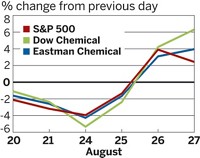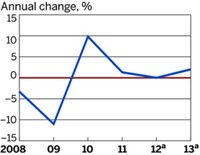Advertisement
Grab your lab coat. Let's get started
Welcome!
Welcome!
Create an account below to get 6 C&EN articles per month, receive newsletters and more - all free.
It seems this is your first time logging in online. Please enter the following information to continue.
As an ACS member you automatically get access to this site. All we need is few more details to create your reading experience.
Not you? Sign in with a different account.
Not you? Sign in with a different account.
ERROR 1
ERROR 1
ERROR 2
ERROR 2
ERROR 2
ERROR 2
ERROR 2
Password and Confirm password must match.
If you have an ACS member number, please enter it here so we can link this account to your membership. (optional)
ERROR 2
ACS values your privacy. By submitting your information, you are gaining access to C&EN and subscribing to our weekly newsletter. We use the information you provide to make your reading experience better, and we will never sell your data to third party members.
Business
Financial Turmoil Worries Industry
Possible recession, high raw material costs likely to squeeze chemical profits in 2008
by Melody Voith
March 24, 2008
| A version of this story appeared in
Volume 86, Issue 12

THE LATEST ROUND of turmoil in U.S. financial markets is forcing chemical company executives and Wall Street analysts to reassess the industry's prospects for 2008. Overall, they predict gloom but not much doom.
The catalyst for the soul-searching even among chemical industry leaders is the demise of the venerable securities firm Bear Stearns, which was highly exposed to the weak housing market because of its ownership of mortgage-backed securities. Two days after rival JPMorgan Chase said it would buy the company at a fire-sale price, the Federal Reserve Board cut its overnight lending rate to 2.25% in an aggressive move to add liquidity to the credit markets and hold off recession.
Housing is intimately connected to the quavering credit market. New home construction, which depends heavily on chemicals and materials, continues to slump. According to the Census Bureau, February housing starts fell 6.7% below January numbers.
Voicing a related concern, Dow Chemical CEO Andrew N. Liveris told Reuters during a recent Wall Street Journal conference on the environment and economics that he is worried about the impact that tightening credit may have on the nonresidential building market. In fact, a March 14 survey by PricewaterhouseCoopers warns of a decline in commercial real-estate prices and an oversupply of retail capacity.
Real estate's decline affects the chemical industry both directly and indirectly. According to the American Chemistry Council, each new home contains some $17,000 worth of chemicals. In addition, falling confidence among homeowners about the equity in their homes and the lack of credit for purchases may crimp demand for manufactured products.
"We (Dow) are starting to orient ourselves for a worse year economically than we had even planned as recently as three months ago," Liveris told Reuters.
In a report to clients, Lehman Brothers chemical stock analyst Sergey Vasnetsov warned, "If U.S. consumer spending were to decline, then its impact would be felt in U.S. industrial production." Vasnetsov has reduced his 2008 earnings projections for the specialty chemicals companies he follows. He characterizes stock in industrial gas companies Praxair and Air Products & Chemicals as safe havens from the economic cycle.
DuPont is also signaling that it won't be hurt by the country's economic woes anytime soon. At a March 14 investor conference, CEO Charles O. Holliday laid out his plans to accelerate annual revenue growth 7-9%, up from a current rate of 5%. DuPont increased its first-quarter earnings outlook by a few pennies per share.
So far, stock prices in the chemicals sector have held steady. A March 17 report from JPMorgan Chase chemical analysts pointed to a year-to-date gain of 1.5% for the industry compared with a 9.7% decline for the broader Standard & Poor's Industrials Index.
This stability is due in large part to the weak dollar, which, by making U.S. exports more competitive on the world market, continues to be "the only friend" of U.S.-based chemical makers, according to Vasnetsov. He predicts that exports will continue to help in the near future but says "the overall macroeconomic picture is clearly gloomier."
Along with falling demand from customer sectors such as the housing industry, chemical companies face continuing high costs for energy and other raw materials. "We've got a weird situation where commodity prices are going up, up, up," says Frederick M. Peterson, president of the chemical consultancy Probe Economics. "If recession sets in, chemical companies will get seriously squeezed for the next year until commodity prices go down. It will not be good for profits."






Join the conversation
Contact the reporter
Submit a Letter to the Editor for publication
Engage with us on Twitter